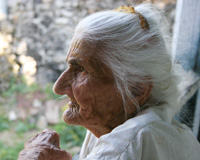
We Need a Commandos Today
The village of Togh is proud of its heroes--Vigen Grigoryan, Armen Gasparyan, Arkady Ter-Tadevosyan, Ashot Khachatryan, Robert Sarkissyan, Susanna Balayan, and others. Not all of them are alive today. The village lost thirty-two people to the war. “Thirty-two victims is a great figure for our village, but we are proud and we believe that the liberation of Karabakh was started in Togh by Commandos,” said Galya Airjanyan.
Today the most respected and authoritative people in Togh are those who had personal contact with Commandos—Arkady Ter-Tadevosyan. Husband and wife Stepan and Karine are especially proud because the renowned commander stayed at their house when he was in Togh during the war.
Mrs. Galya is also very proud, because her daughter's songs inspired Commandos during the hardest and most troubling times.
Today Togh has 714 inhabitants, only fourteen more than there were during the war. There are fewer marriages among the young people, because of high unemployment. Most of the young people live off the pensions of their parents. The population is getting older. 96-year-old Haykush Bagdasaryan is the oldest person in the village. She is known as the most tamuz-takuz , or tidy, woman in Togh.
My visit was a surprise for Haykush Baji, or Granny Haykush. She spent about fifteen minutes trying to determine if there was any blood relationship between us. Once she was convinced that we were not related, she began to list the names of her relatives who live in Yerevan and asked me to send them her warmest regards. She became very uncomfortable when I told her that I had come not just to talk but also to take her photo. “I was the tidiest woman in the village, but I can't get around anymore,” she said, and asked for some time to do her hair.
The 96-year-old woman cooks on a wood-burning stove in the summer heat to save electricity. She lives alone and never leaves home, not even for a walk to the center of the village. The villagers visit her, bring eggs, yogurt, and sugar and ask about her health. She has two sons, 75 and 72 years old, but she doesn't want to go to live with them. “My home and my life are in Togh. How can I leave here? I am not going anywhere.”
 Haykush Baji loves to talk about her younger days. “I was very pretty when I was a girl. That's not what I say—that's what everybody says. My husband kidnapped me. A Turkish man wanted to marry me, but my husband took me.” Haykush Baji grew angry when I asked her if she would have lived with an Azerbaijani if her husband hadn't kidnapped her. “I didn't even want my husband, let alone an Azerbaijani.”
Haykush Baji loves to talk about her younger days. “I was very pretty when I was a girl. That's not what I say—that's what everybody says. My husband kidnapped me. A Turkish man wanted to marry me, but my husband took me.” Haykush Baji grew angry when I asked her if she would have lived with an Azerbaijani if her husband hadn't kidnapped her. “I didn't even want my husband, let alone an Azerbaijani.”
Haykush Baji is happy with the life she's had, but is afraid that the young people will leave Togh since there is no work. “There are no young people anymore in our village. They've all have gone to the city. I don't know what's so great about the city,” said the 96-year-old woman from Togh.
All the talk about leaving the village makes the older people angry. 73-year-old Hrant Davtyan, who has a second-degree disability, thinks that those who have deserted the village have betrayed Karabakh, though he doesn't say how they can they live without jobs or income. He doesn't live well himself, but he never thinks about leaving. “I live in envy of every person who dies. My son is 34 years old; he was wounded several times in the war and now he is mentally ill. My other son died in the war. My wife has heart disease. I have no means of subsistence, but I am not going to leave Togh. My son was buried in this village.”
The most pressing problem in Togh is drinking and irrigation water. The drinking water is seven kilometers away from the village. Today only one pipeline of the seven that run into the village is operational. Each villager receives one to one-and-a-half cubic meters of water, instead of fifteen to twenty. The villagers can't do any farming because there is no water for irrigation. Their problems grew worse this year by a fire that started on July 12, which totally destroyed their 81-hectare wheat field. The village got no compensation. This will add to the problems of Togh and force some villagers to seek their daily bread elsewhere.
Given the unresolved war and uncertain status of Karabakh, the emigration of the young is more than the remaining villagers can bear. “We need a Commados today” said Galya Amirjanyan. It seemed that to her, Commandos was not just a man, but a state of mind.
 Videos
Videos Photos
Photos
Write a comment